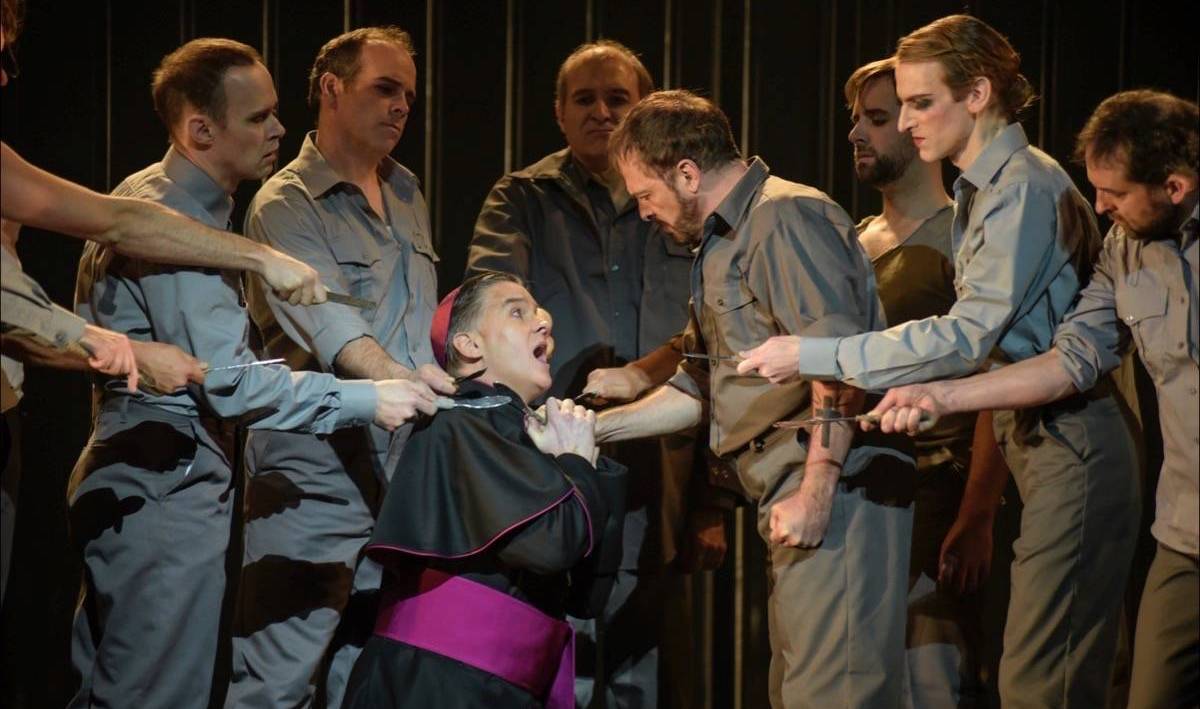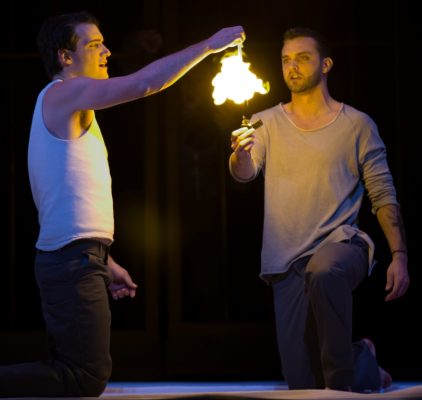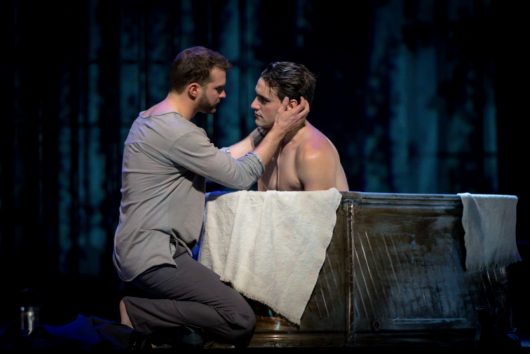Opera creator speaks of forbidden love
Posted on October 19, 2017 By Mike Ross Entertainment, Front Slider, life, Music, Theatre
 People who’ve never seen opera before are being drawn to Lilies (Les Feluettes) – maybe because it’s billed as “Canada’s first gay opera.”
People who’ve never seen opera before are being drawn to Lilies (Les Feluettes) – maybe because it’s billed as “Canada’s first gay opera.”
But in the upcoming Edmonton Opera production based on Michel Marc Bouchard’s 1987 play, the opera’s creator isn’t making a big deal about the gay thing. It’s an opera. As such, it may contain drama, romantic triangles, heartbreak, tragedy, murder, and forbidden love – themes great operas have tackled for centuries.
Composer Kevin March says in a recent interview, “We never, ever, ever refer to an opera like Don Giovanni as the ‘the heterosexual opera Don Giovanni,’ we would never dream of going to the singer who’s singing the role of Don Giovanni, never bother trying to find out if the singer is gay, and would never ask, ‘How difficult is it to play a heterosexual character?’”
 The two leads in Lilies happen to be heterosexual, March says, and as such, they have recently been asked, “‘Is it difficult to play a gay character?’ Because of course it’s not. Every character is a role they’re playing – there’s no difference between a heterosexual character or a gay character on stage.”
The two leads in Lilies happen to be heterosexual, March says, and as such, they have recently been asked, “‘Is it difficult to play a gay character?’ Because of course it’s not. Every character is a role they’re playing – there’s no difference between a heterosexual character or a gay character on stage.”
The difference in this story is a love that literally dare not speak its name – because you could get thrown in jail; being gay was a crime in Canada until 1969. This adds an extra element of drama to an already dramatic work, which unfolds in Quebec in 1944 when a bishop is summoned to give last rites to a prisoner who turns out to be the bishop’s former lover. Flashbacks to 1912 ensue. But then March asks us to consider a much older story.
“In Quebec,” he says, “this play is often referred to as Quebec’s Romeo and Juliet, and even in that story we see forbidden love. Romeo and Juliet is about falling in love with a person from the wrong side of the tracks. This is nothing new to drama or opera. That element has been around a long time.”
Lilies was also made into a 1996 Canadian film – which is what gave March the idea to make it into an opera.
“It didn’t feel like a film, it felt like an opera,” he says. “The film was in English, and there are so many passages, so many lines, so much dialogue that is so gorgeous, so poetic and so musical. So I’m imagining these lines being sung. It was the fuse that lit the fire. The characters are great. They’re layered. They’re interesting. Some of them are eccentric. That really makes a difference, and there are situations that are operatic. There’s a lot of beautiful, tender romance, there’s a lot of tragedy, there are really intimate moments, and really epic moments in the story. You go from a very tender moment in the bathtub to a really epic moment where the entire stage is ablaze – all of these things just scream opera to me.”
March says he was figuring out who he needed to call before he even left the movie theatre. Bouchard was so keen on the idea that the playwright wrote the opera’s libretto (lyrics). It took about four years of full time work to finish.
 The challenge here is not about sexual orientation, but language. Though the film is in English, Les Feluettes is a French play (the title is also a slur for homosexuals) – and it’s been made into a French opera. March isn’t French. He was raised in America and lives in Australia. He of course is fluent in the universal language of music (including many of his favourite French composers), and can compose, arrange and score all the music for an entire symphony orchestra and a cast of 30 opera singers. When March got the commission to write the opera, he ran right out to take French lessons. He and his team tinkered for weeks over the proper cadence of the vocal parts. There’s also a scene that takes place in during a wedding in a swanky Quebec cabaret in 1912 – so the composer researched what sort of live music might be heard in such a place, and although he has no background in folk music, sought out and created an arrangement of The Hangman’s Reel, apparently a jokey tradition at Francophone weddings. You don’t hear fiddle and accordion in your average opera.
The challenge here is not about sexual orientation, but language. Though the film is in English, Les Feluettes is a French play (the title is also a slur for homosexuals) – and it’s been made into a French opera. March isn’t French. He was raised in America and lives in Australia. He of course is fluent in the universal language of music (including many of his favourite French composers), and can compose, arrange and score all the music for an entire symphony orchestra and a cast of 30 opera singers. When March got the commission to write the opera, he ran right out to take French lessons. He and his team tinkered for weeks over the proper cadence of the vocal parts. There’s also a scene that takes place in during a wedding in a swanky Quebec cabaret in 1912 – so the composer researched what sort of live music might be heard in such a place, and although he has no background in folk music, sought out and created an arrangement of The Hangman’s Reel, apparently a jokey tradition at Francophone weddings. You don’t hear fiddle and accordion in your average opera.
This isn’t your average opera. March reports that audiences for the first two runs of the show in Montreal, where it premiered in 2016, and Victoria “were unlike anything I’ve ever seen before. Audiences were on their feet before the first curtain call. Something happened, and we were not prepared for that kind of response – standing ovations every night. The crowds were just amazing.”
He also talked to a number of audience members who indeed had never seen opera before. Is it the allure of “Canada’s first gay opera’? Admit it or not, it’s a milestone.
“That may be true,” March says, “and if so, we’re happy to be part of it. The thing is we want is for people to have a really amazing night at the opera. We’re happy for them to come for whatever reason they choose to come – whether it’s a new opera, whether the characters are gay, or they liked the play, or they liked the film. It doesn’t matter why people come.”
Just as it doesn’t matter about the sexual orientation of the characters. Love is universal – and you couldn’t have great opera without it.
Lilies (Les Feluettes) opens Saturday night at the Jubilee Auditorium, and also plays Tuesday, Oct. 24, and Friday, Oct. 27.











